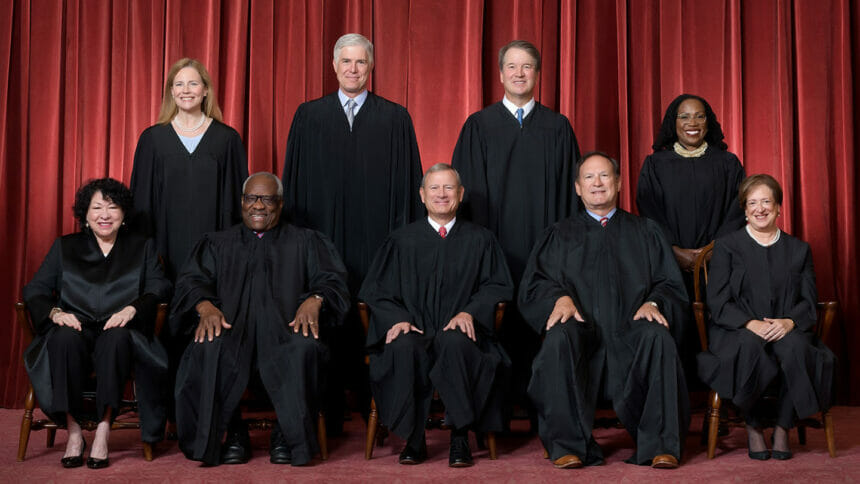
The Supreme Court this morning threw out a long-standing doctrine that has given regulatory agencies, including the Centers for Medicare & Medicaid Services, broad discretion to set rules for the entities they cover.
Abandonment of the so-called Chevron doctrine will likely have implications for nearly every US industry and could even affect the outcome of a lawsuit challenging CMS’ authority to issue a nursing home staffing mandate.
“Perhaps most fundamentally, Chevron’s presumption is misguided because agencies have no special competence in resolving statutory ambiguities. Courts do,” the majority wrote in a 6-2 decision in Loper Bright Enterprises vs. Raimondo. “The only way to ‘ensure that the law will not merely change erratically, but will develop in a principled and intelligible fashion,’ … is for the Court to leave Chevron behind.”
Importantly, the Court said its ruling today does not call into question prior cases that relied on the 40-year-old Chevron framework.
“The holdings of those cases that specific agency actions are lawful — including the Clean Air Act holding of Chevron itself — are still subject to statutory [precedent], despite the Court’s change in interpretive methodology,” the justices added.
Chief Justice John Roberts authored the majority opinion, with Justices Elena Kagan and Sonia Sotomayor offering a dissent. Justice Ketanji Brown Jackson sat out, having weighed in on the case as a lower court judge.
Existing practice requires courts to give federal regulators deference when a statute is unclear or could be interpreted two ways, but experts have predicted a change will embolden more lawsuits seeking to unravel “ambiguous” federal statutes.
Several justices in January showed their willingness to side with businesses in Loper Bright and a companion case, both of which involved regulation of fisheries.
Today’s decision will likely require Congress to craft more detailed legislation to expressly delegate powers, a change Kagan warned against.
Giving deference to federal agencies “has become part of the warp and woof of modern government, supporting regulatory efforts of all kinds — to name a few, keeping air and water clean, food and drugs safe, and financial
markets honest,” Kagan wrote. “And the rule is right. This Court has long understood Chevron deference to reflect what Congress would want, and so to be rooted in a presumption of legislative intent. Congress knows that it does not — in fact cannot — write perfectly complete regulatory statutes.”
This new interpretation could “have a significant impact” in keeping administrative agencies from overreaching when such delegation doesn’t exist, Mark Reagan, managing shareholder of Hooper, Lundy & Bookman previously told McKnight’s Long-Term Care News.
“This will have impact across the entire regulated economy, including Medicare, Medicaid and other healthcare legislation,” he said. “If overruled, I would expect there to be serious consideration in some quarters to reverse prior decisions made in reliance on Chevron in the healthcare industry, particularly those involving complex Medicare reimbursement methodologies.”
In the long-term care sector, Reagan said the Centers for Medicare & Medicaid Services might have to change how it approaches its Requirements of Participation and reimbursement rules.
That might not constrain CMS, Reagan said, but instead lead to more opportunities for successful litigation if the agency’s presumed authority “is far from clear.”
Reagan and others have argued that repeal or revision of Chevron could be a helpful factor in a legal case seeking to undo the CMS-promulgated nursing home minimum staffing rule.
Friday’s ruling follows another anti-regulation decision by the High Court on Thursday. Justices voted 6-3 against the Securities and Exchange Commission’s use of in-house judges, finding that the regulatory process violates the right to trial by jury.
In a dissenting opinion she read from the bench, Justice Sonia Sotomayor accused the conservative members of her court of making “a power grab,” one in a series of moves that undermines the nation’s long history of allowing regulatory agencies broad rule-making authority.
“Litigants seeking further dismantling of the ‘administrative state’ have reason to rejoice in their win today, but those of us who cherish the rule of law have nothing to celebrate,” she said.
Kagan echoed that Friday in her Loper Bright dissent, saying the Court has in recent years “too often taken for itself decision-making authority Congress assigned to agencies.”
She characterized the switch on Chevron as a rule of judicial humility giving way to a rule of “judicial hubris.”
This is a developing story. Stay with McKnight’s for additional coverage.




